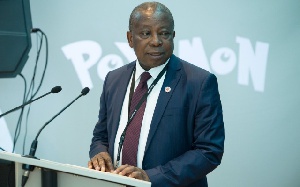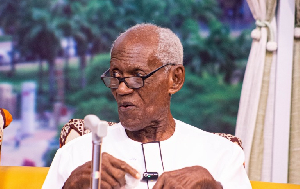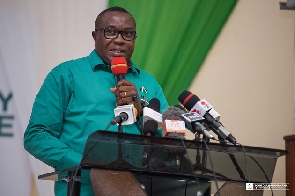 Kwaku Agyemang-Manu is the Health Minister
Kwaku Agyemang-Manu is the Health Minister
Primary Health Care is essential health care made universally accessible to individuals and families in the community by means acceptable to them, through their full participation and at a cost that the community and country can afford. It forms an integral part both of the country’s health system of which it is the nucleus and of the overall social and economic development of the community.
This ideal model of healthcare was adopted in the declaration of the International Conference on Primary Health Care held in Alma Ata, Kazakhstan in 1978 (known as the "Alma Ata Declaration"), and became a core concept of the World Health Organization's goal of Health for all. There were many factors that inspired PHC; a prominent example is the “Barefoot doctors of China”.
The ultimate goal of primary healthcare is the attainment of better health services for all. Health care or healthcare is the maintenance or improvement of health via the prevention, diagnosis, and treatment of disease, illness, injury, and other physical and mental impairments in human beings. Healthcare is delivered by health professionals (providers or practitioners) in allied health fields.
Physicians and physician associates are a part of these health professionals. Dentistry, midwifery, nursing, medicine, optometry, audiology, pharmacy, psychology, and other health professions are all part of healthcare. It includes work done in providing primary care, secondary care, and tertiary care, as well as in public health.
A health system, also sometimes referred to as health care system or as healthcare system, is the organization of people, institutions, and resources that deliver health care services to meet the health needs of target populations. In Ghana health care system, there are specific functions, challenges and results of inadequate practice involved in practicing primary health care.
Primary health care addresses the main health problems in the community, providing promotive, preventive, curative, and rehabilitative services accordingly. Since these services reflect and evolve from the economic conditions and social values of the country and its communities, they will vary by country and community, but will include at least promotion of proper nutrition and adequate supply of safe water; basic sanitation; maternal and child care, including family planning; immunization against the major infectious diseases; prevention and control of locally endemic diseases; education concerning prevailing health problems and methods of preventing and controlling them; and appropriate treatment for common diseases and injuries.
In Ghana healthcare system, when health professionals are practicing primary health care, they encounter certain challenges such as; first, the structure of the teamwork that is considered essential for achieving the goal of primary health care.
The structure of the team work is mostly fragmented, with hierarchal practices persisting, and an inequality between the various professional categories, usually with various professions being subordinated to the knowledge and practices of medicine. Second, there is the problem of inadequate or insufficient training of the health professionals. Third, the need to overcome the significant deficits in working conditions, including instability in labor relations, precariously paid wages, and excessive working hours, problems in the teams/population ratio, and shortcomings in terms of instruments and work environment. Fourth, the importance of facing the problem of the asymmetrical relationship between professionals and health users: the difficulties in the involvement of professionals with the community, establishment of the link of mutual respect and correspondence between professionals and users of the health services. The fifth is to increase overall coverage and to reach the poor more effectively because “most of the increased spending in the health sector in recent years has gone into other sectors to the neglect of the primary health component” (Public Agenda, 6 February 2008).
In Ghana, Primary health care is mostly not delivered adequately and appropriately due to lack of full governmental and financial support, low number of high professional healthcare givers because of the high cost and years of medical training, high level of bureaucracy in health centers which often lead to crisis and misunderstandings between various professions working in the health center(such as that of medical doctors and physician assistants), lack of health facilities in rural areas and improper division of the economic support given to the health sector.
And due to the inappropriate practice of primary health care in health facilities located in rural areas, urban areas and other areas with high healthcare demand, Ghana have failed to achieve MDG 4(which is to reduce child mortality rate from deaths per 1,000 live births to 43 and increase measles immunization to 100 per cent by 2015) by 2015, failed to achieve MDG 5(which is to reduce maternal mortality and make it fall to 145 cases per 100,000 live births) by 2015; have an inadequate environmental sanitations in most health facilities which is a major contributor to the high incidence of Nosocomial infections; have a low healthcare devices such as stethoscopes, sphygmomanometers, etc. which results in poor punctual service deliveries to inpatients and outpatients, thereby, leading to an increase in nosocomial death rates and secondary infections; have a low pharmaceutical availability and affordability; and finally, have increase in morbidity and mortality rates in rural areas.
In conclusion, Primary healthcare (PHC) refers to "essential health care" that is based on “scientifically sound and socially acceptable methods and technology, which make universal health care accessible to all individuals and families in a community and healthcare is the organization of people, institutions, and resources that deliver health care services to meet the health needs of target populations.
It provides health services at community level. Challenges of PHC include the structure of team work, insufficient training, significant deficiencies in working conditions, and inadequate physician to patient relationship and service delivery to the poor.
Primary healthcare is not delivered adequately due to insufficient support, insufficient health care givers, high level of bureaucracy and lack of health facilities. Inadequate primary health care delivery mainly leads to increase in morbidity and mortality rates.
All these can be solved or managed by incredible governmental support, increasing financial support, decreasing the cost of health training, increasing the rate of equality between healthcare professions, posting health care givers at their desired places, increase in intersectoral action, increasing the provision of goods and resources to community-based health center, increasing community involvement and increasing the rate of governmental surveillance system both in and out of hospital facilities for better evaluation and assessment of the health center in all categories such as environmental sanitation status, degree of health care delivery, etc.
The writer is a University of Cape Coast 2nd Physician Assistant student.












